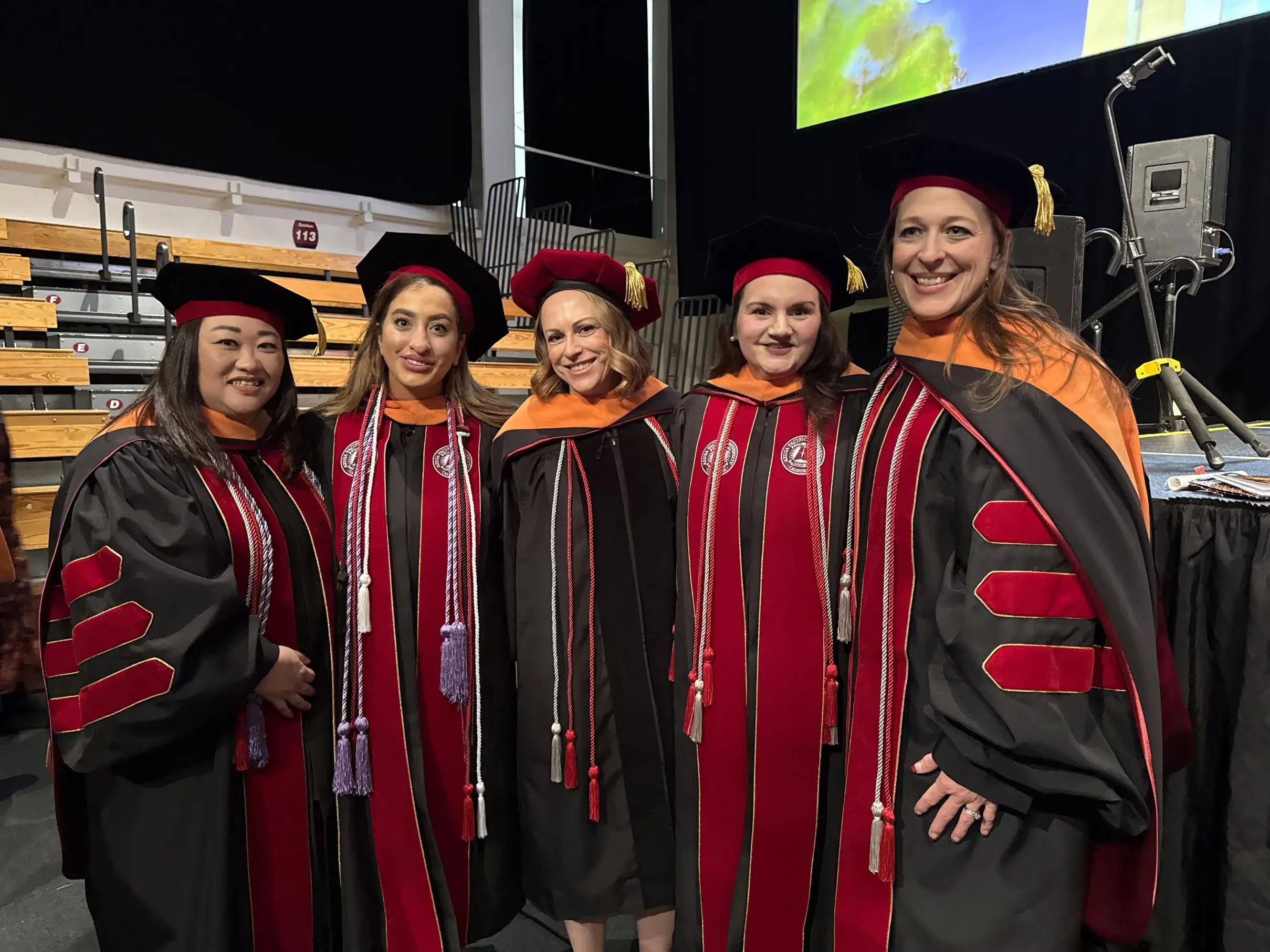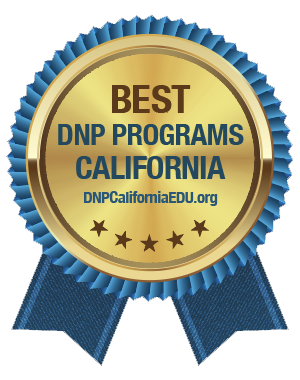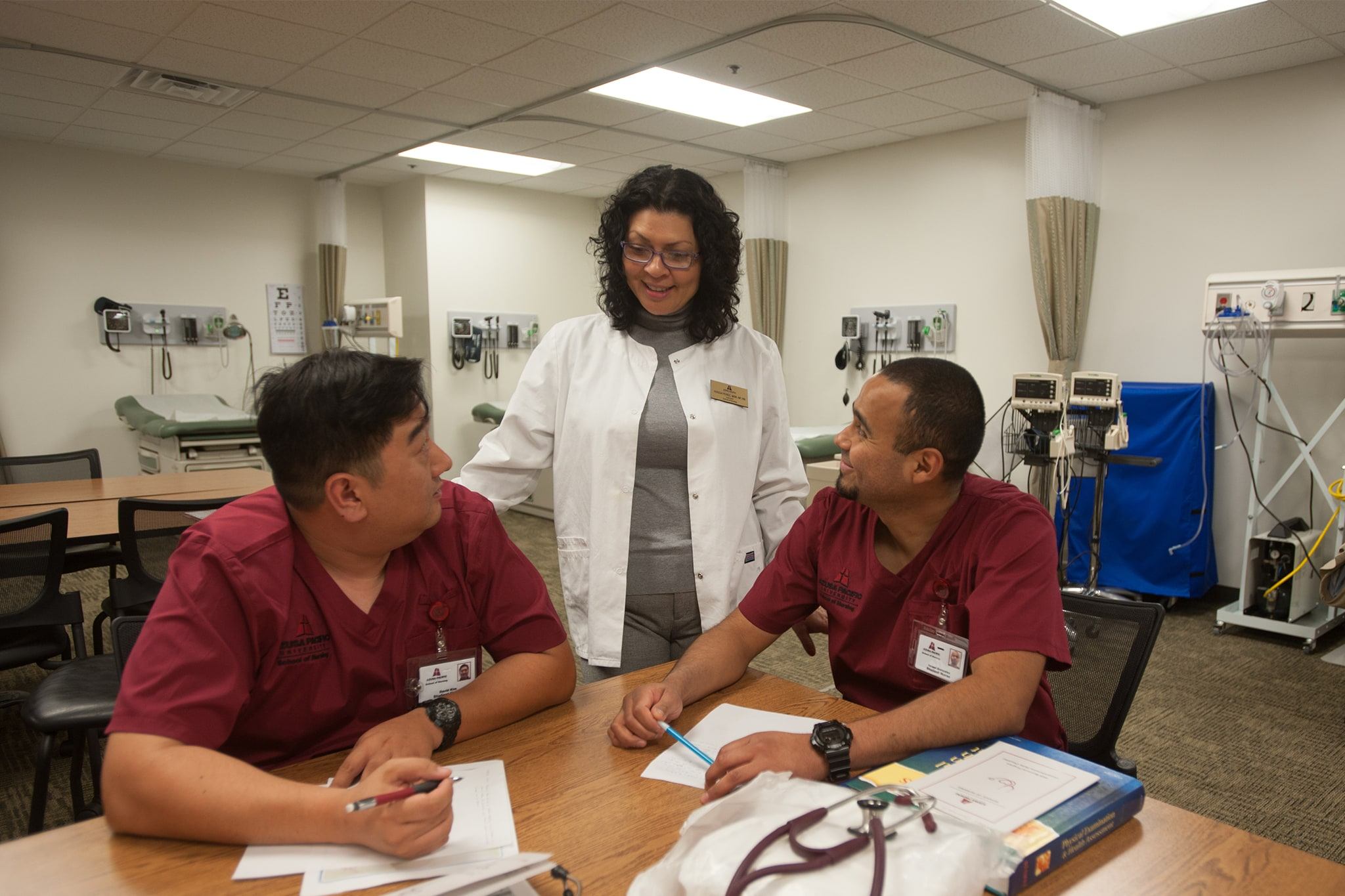
Doctor of Nursing Practice
Earn a Doctor of Nursing Practice (DNP) Degree at Azusa Pacific University
You’ll graduate prepared for the highest level of practice in the current, complex healthcare environment. You’ll advance your career through an evidence-based clinical approach, emphasizing nursing leadership in healthcare teams. You’ll also work to improve healthcare systems along with safety and clinical outcomes. You can choose the low-residency option—designed for working nurse leaders—that allows you to balance your life, work, and studies.
The DNP program prepares graduates for advanced nursing practice in direct roles (such as those who are RNs or APRNs) and indirect roles (health care systems leadership). The program conforms to the American Association of Colleges of Nursing standard and the AACN Essentials: Core Competencies for Professional Nursing Education (2021).
APU Ranked Among Best Grad Schools by Money
Azusa Pacific University was ranked in Money’s Best Graduate School Programs 2025 for education and nursing, focusing on affordability, value, and return on investment.

Program at a Glance
The nationally ranked School of Nursing prepares nurses to lead the way in healthcare by providing a deeper level of compassionate care in clinics, hospitals, schools, and beyond.
DNPCaliforniaEDU.org named APU’s DNP program one of the best in California.

Upcoming Events
Virtual Information SessionTuesday, August 26, 5-6 p.m.Virtual Same-Day Admissions Event
Wednesday, September 17, 4-8 p.m.
Application Deadline
- Fall semester: July 21
- Spring semester: November 15
Program Information
- Program Units: 39
- Cost per Unit: $1,160
- Base Cost: $45,240*
Location
- Online

Gain Hands-on Experience
- Achieve the highest level of degree for nursing practice.
- Work as a policy analyst, clinical operations director, or chief nursing officer.
- Study in a program that utilizes an evidence-based clinical approach.
- Focus on the prevention, assessment, and treatment of complex health issues.
By the Numbers
Get Started
Program Details
The Doctor of Nursing Practice program offers doctoral-level studies in a clinically focused learning environment. The DNP degree prepares advanced practice nurses and nurse leaders to bring the highest level of clinical expertise to patients, nursing students, healthcare systems, health policy formation, and clinical research. Graduates of the DNP program help contribute to the body of nursing knowledge and the practice of nursing to improve health care globally.
Browse the tabs below for more information. If you have questions, visit the Student Services Center page, and we’ll make sure you get the info you need.
The DNP program prepares graduates for advanced nursing practice in direct (certified registered nurse anesthetist, clinical nurse specialist, midwife, nurse practitioner) and indirect (health care systems leadership) roles. The program conforms to the American Association of Colleges of Nursing standard, which calls for DNP-level preparation for all advanced practice nursing specialties.
Admitted Student Deposit
Admitted students will be required to submit a $500 nonrefundable admissions deposit to hold their spot in the cohort. See admissions representative for details.
Admission Requirements—Domestic Applicants
The university graduate and program admission requirements below must be met before an application is considered complete.
Admission of students into the DNP program will be evaluated by each of these criteria.
- Graduate application for admission
- $45 nonrefundable application fee
- Official transcripts from all institutions leading to and awarding the applicant’s
bachelor’s and master’s degrees from a regionally accredited institution and all postbaccalaureate
study
An official transcript is one that Azusa Pacific University receives unopened in an envelope sealed by the former institution and that bears the official seal of the college or university. A cumulative minimum 3.0 (on a 4.0 scale) grade-point average on the posted degree is required for regular admission status. Provisional admittance may be granted to individuals with a lower GPA if competency can be shown through multiple measures. - Transcripts should show completion of a BSN and a master’s degree (master’s degree may be in nursing or another field). Copy of any professional certifications/registrations used by nurses with advanced practice, state or national. Transcripts may be used as evidence if needed.
- Letter from your advanced practice program stating the number of clinical hours completed as part of that program. (Up to 500 hours may be transferable toward the DNP program’s required total of 1,000 hours, per departmental approval.) Show evidence that the letter has been requested.
- Graduate-level statistics course, taken within the last five years
- Graduate-level nursing research course
- Evidence of written creative work and/or scholarly papers
- Written statement of educational objectives, specific focus of research, and career goals
- Current curriculum vitae or résumé
- Two letters of recommendation from persons who are suited to evaluate applicant’s qualifications for DNP education in nursing, including at least one from the applicant's direct supervisor and/or a previous faculty member
- Faculty member(s) interview with the prospective student
- Status as a licensed registered nurse; evidence of current licensure as a registered nurse in the state of California is mandatory at the time of program entry
Send official transcripts to:
Office of Graduate and Professional Admissions
Azusa Pacific University
PO Box 7000
Azusa, CA 91702-7000
[email protected]
Admission Requirements—International Applicants
At this time, international students who require a form I-20 or DS-2019 (F-1 or J-1 visas) are not being accepted to the DNP program, which is 100 percent online due to current Homeland Security requirements.
International students who are in the United States on another type of nonimmigrant status may be considered for admission. For more information about which nonimmigrant statuses can apply and admissions requirements for international students, contact APU’s International Services.
Many financial aid options are available to make your DNP program affordable.
Delivering high-quality graduate programs takes a comprehensive support system. Your investment in an advanced degree includes those services and personnel that partner with you in pursuit of higher education. Below is a detailed breakdown of the fees associated with the benefits and services included in your degree program.
School of Nursing Fees
| | Cost |
|---|---|
| Master’s Degrees, Credentials, and Most Certificate Programs (per unit) | $895 |
| PhD in Nursing and Doctor of Nursing Practice (DNP)(per unit) | $1,160 |
| Oncology Nurse Practitioner Certificate (per unit) | $1,160 |
| Audit (per unit) | half-price tuition |
| Nursing Clinical Fee (per semester; includes malpractice insurance) | $600 |
| Graduate Nursing Advanced Practice Lab Fee (per course) | $275 |
Nursing courses may require additional fees. View a complete list of university fees.
All stated financial information is subject to change. Contact the Student Services Center at (626) 815-2020 for more information.
Financial Aid
Several types of financial aid are available to graduate students. The resources range from federal loans and state grants to, for some graduate programs, fellowships and scholarships. For details about financial aid available for your program, please contact the Student Services Center at (626) 815-2020.
Military Benefits
Military members—and in some cases their spouses and dependents—qualify for financial assistance covering tuition, housing, and books. Azusa Pacific is a Yellow Ribbon University and Military Friendly School, so you can be confident that you’ll receive the benefits and flexibility you need to complete your education.
Program-Specific Aid
For more details on these scholarships and funding opportunities, as well as other possible resources, please contact the School of Nursing at (626) 815-5386.
Nurse Faculty Loan Program
The Nurse Faculty Loan Program is a government loan program set up to increase the number of qualified nursing faculty by providing loans to students in advanced nursing education programs. Students must be pursuing a MSN or doctoral nursing degree. The NFLP loans will be forgiven—up to 85 percent of the amount received—over a consecutive four-year period if the student commits to serve as full-time faculty at a school of nursing following graduation. Faculty at private universities, state schools, and community colleges are eligible. Students receiving these loans must also complete the nursing education courses prior to graduation.
School of Nursing Alumni Tuition Discounts
APU’s School of Nursing offers an alumni tuition discount for APU alumni starting in the following graduate programs:
- MSN in Healthcare Administration and Leadership
- MSN in Nursing Education
- PhD in Nursing
- Doctor of Nursing Practice (DNP)
Students must be in good academic standing and maintain satisfactory academic progress with a minimum cumulative grade-point average (GPA) of 3.0. Students must be enrolled at least half-time. If qualifications are met, the discount may be renewed each term. APU will pay $500 per term (up to $2,000 over the course of the program). This discount cannot be combined with other institutional aid. Contact Student Financial Services for complete eligibility details.
Note: Award and eligibility are applicable for the 2022-23 academic year and apply to students admitted beginning fall 2020. The discount is subject to change.
To view specific requirements and coursework information, visit the current academic catalog:
How many units do I take each semester?
Students take 6-7 units of core program courses per semester in a full-time course progression.
How long is a semester?
Each semester is 16 weeks, though summer courses may also be 8 weeks or 12 weeks.
How many hours does each course require?
A 3-unit course equates to 135 hours per semester.
Study Progression and Graduation Requirements
Progression in the program requires active enrollment status and maintaining a minimum cumulative 3.0 GPA. Graduation requirements include a minimum cumulative 3.0 GPA, completion of the required number of clinical hours, and successful defense and completion of the evidence-based translational research project.
Students may not participate in commencement or have the degree posted to their transcript until the document has been accepted by the library. Any exceptions are by petition only.
Leaves of Absence
Students in good standing and making satisfactory progress toward their degrees who must interrupt their studies for a compelling reason (e.g., illness, study abroad, family conditions, or crises) may petition for a leave of absence for a stated period of time not to exceed two years. Requests for a leave must be in writing and state both the reasons for the leave and the semester in which the student will re-enroll. Leaves of absence must be approved by the director of the DNP program, the chair of the doctoral studies department, and the dean of the School of Nursing in advance of the semester for which the leave is requested.
The petition for return to enrolled status should be filed one full term before the intended date of re-enrollment. If the student went on leave with conditions for re-enrollment, these must be fulfilled before re-enrollment may occur. If a student is on leave for two years, the Doctoral Admissions Committee, as well as the DNP director, the chair of the doctoral department, and the dean will review her/his re-enrollment petition. Depending upon the amount of time elapsed, the student’s stage of study in the program, and the student’s academic activity during the leave, readmission may be contingent.
Evidence-based Translational Research Project
The evidence-based translational research project (TRP) is the culminating scholarly, clinical inquiry project for students in the Doctor of Nursing Practice program. The TRP represents the translation or application of research evidence into nursing with advanced practice. The completion of the TRP lays the groundwork for future scholarship.
The process of conducting a TRP consists of several steps: (a) the identification and selection of an area of interest, (b) the writing of an evidence-based TRP proposal, (c) the selection and formation of a TRP Scholarly Project Committee, (d) submission of the TRP proposal to the Scholarly Project Committee, (e) approval of TRP proposal by the Scholarly Project Committee, (f) submission of TRP for IRB approval, (g) implementation of the TRP, (h) presentation and approval of completed TRP by the Scholarly Project Committee, (i) submission of a hard-bound copy of the completed TRP to the director of the DNP program, and (j) a completed manuscript on the TRP ready for submission to a peer-reviewed journal.
If you have questions, we’re here to help! Connect with a representative who can walk you through the program details and application process.
Contact Your Admissions Representative
Additional Program Contact
School of Nursing
Phone
(626) 815-5386
Azusa Pacific University
PO Box 7000
Azusa, CA 91702-7000
Hours
Monday-Friday, 8 a.m.-4:30 p.m.
(voicemail messages left will be addressed on the next business day)
Student Services Center
Contact (626) 812-3016 or [email protected], and visit apu.edu/ssc for details on the admissions process, financial aid, and class registration.
International Services
International students should contact +1-626-812-3055 or [email protected], and visit apu.edu/international/.
- Azusa Pacific University is accredited by the WASC Senior College and University Commission (WSCUC).
- The baccalaureate degree in nursing, master’s degree in nursing, and Doctor of Nursing Practice at Azusa Pacific University are accredited by the Commission on Collegiate Nursing Education (CCNE).
Career Outlooks and Outcomes
Featured Faculty

Mary Lynne Knighten
DNP Program Director, Associate Professor, and DNP Clinical Residency Coordinator

Christina Bivona-Tellez
Assistant Professor

Kathleen Ruccione
Professor, Program Director, SON PhD Program

APU School of Nursing Receives $4.4 Million in Grants from HRSA
APU’s School of Nursing, the third largest producer of nurses in the state of California, received two grants totaling $4,396,200 from the Health Resources and Services Administration to help students afford a nursing education.